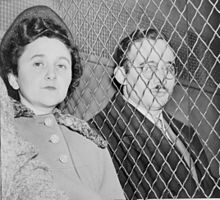Ethel and Julius Rosenberg
| Julius and Ethel Rosenberg | |
|---|---|

Ethel and Julius Rosenberg (1951)
|
|
| Born |
September 28, 1915 (Ethel) May 12, 1918 (Julius) Manhattan, New York City (both) |
| Died | June 19, 1953 (aged 37) Ethel June 19, 1953 (aged 35) Julius Ossining, New York (both) |
| Resting place |
Wellwood Cemetery Suffolk County, New York |
| Occupation | Actress, singer, secretary (Ethel), electrical engineer (Julius) |
| Criminal charge | Conspiracy to commit espionage |
| Criminal penalty | Death by electric chair |
| Criminal status | Executed |
| Children | Michael Meeropol, Robert Meeropol |
Julius and Ethel Rosenberg were United States citizens who were executed for conspiracy to commit espionage for the Soviet Union. They were instrumental in the transmission of information about top-secret military technology and prototypes of mechanisms related to the atomic bomb, which were of value to the Soviet nuclear weapons program and also provided top-secret radar, sonar, and jet propulsion engines to the Soviet Union.
Other co-conspirators were imprisoned, including Ethel's brother, David Greenglass, who supplied documents from Los Alamos to Julius and who served 10 years of his 15-year sentence; Harry Gold, who identified Greenglass and served 15 years in Federal prison as the courier for Greenglass. Klaus Fuchs, a German scientist working in Los Alamos and handled by Gold, provided vastly more important information. He served nine years and four months, convicted in Great Britain.
For decades, many defenders of the Rosenbergs, including their sons Michael and Robert Meeropol, maintained that Julius and Ethel were innocent and victims of Cold war paranoia. After the fall of the USSR, much information concerning them was declassified, including a trove of decoded Soviet cables, code-named VENONA, which detailed Julius's role as a courier and recruiter for the Soviets and Ethel's role as an accessory. Their sons' current position is that Julius was legally guilty of the conspiracy charge, though not of atomic spying, while Ethel was only generally aware of his activities. They believe that he did not deserve the death penalty and that she was wrongly convicted. They continue to campaign for Ethel to be legally exonerated.
In 2014, five historians who had published on the Rosenberg case wrote that Soviet documents show that "Ethel Rosenberg hid money and espionage paraphernalia for Julius, served as an intermediary for communications with his Soviet intelligence contacts, provided her personal evaluation of individuals Julius considered recruiting, and was present at meetings with his sources. They also demonstrate that Julius reported to the KGB that Ethel persuaded Ruth Greenglass to travel to New Mexico to recruit David as a spy."
...
Wikipedia
